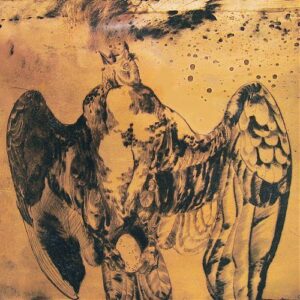The word ‘unique’ is applied far too often these days to be truly helpful, but in the case of James Blackshaw it is entirely accurate. Signed to Michael Gira’s (ex-Swans / Angels of light) fantastically diverse Young God records, James has created a work of ethereal beauty that defies reviewers to place it into any convenient category.
Housing just five tracks in almost fifty minutes of music, ‘The glass bead game’ is an absorbing and difficult piece of work, definitely not for the faint of heart, but utterly rewarding. Devoid of vocals in conventional terms, it features oral (and wordless) contributions from Lavina Blackwell, a classically trained singer, and instrumental contributions from John Contreras (on Cello) and Joolie Wood (Violin, Clarinet and flute) all of whom add depth to the astonishing guitar work on display. First track ‘cross’ is a beautiful piece, nearly nine minutes in length, which passes in the blink of an eye, and highlights everything that is special about this album. Each instrument is dependent on the other so that the music is almost orchestral in feel, with no one person standing out as a star of the track. ‘Bled’ is slower than its predecessor and showcases just what a phenomenal musician James is. The guitar builds into, and over, itself, slowly reaching a crescendo that seems to take an age to arrive, and yet the listener is never bored, trapped inside the reverie that the song creates.
‘Fix’ is the album’s shortest piece, at a relatively svelte six minutes, and utilises the piano to create a haunting melody that could most easily be described as Mogwai playing classical music. ‘Key’ is once again set on the acoustic 12 string, and offers a welcome change of pace from the slow ‘fix’, introducing a more uplifting mood into proceedings) and, again, James uses his instrument to create a wall of sound that is truly mesmerising.
Final track, ‘Arc’ is the undisputed highlight of the album, a sprawling, eighteen minute track, that covers a gamut of emotions and sounds throughout its epic length. Based around James’s piano, with the sustain pedal pushed almost through the floor, the music simply resonates about the listener, encouraging reflection, without ever becoming sombre or depressing. The final track is a remarkable achievement, which justifies the price of the CD alone, let alone the other material on offer here.
In summing up I’d like to start with a warning. In contemplating purchasing this album, you have to consider what it is you want from your music. This is an amazing record played with passion and precision, but it is not for those seeking a quick musical fix, and it requires patience and attention from the listener. The music is deeply personal and encourages thought and introspection, even while it is uplifting and utterly beautiful. For those readers who embrace unexpected forms of music, then this is a minor miracle, a gem of a record created by a talent utterly without peer and one of the most unexpectedly rewarding releases I’ve heard all year. James Blackshaw may well go on to do better works, but whatever his future points to, this work will forever stand as a testament to his skill and artistic vision.




